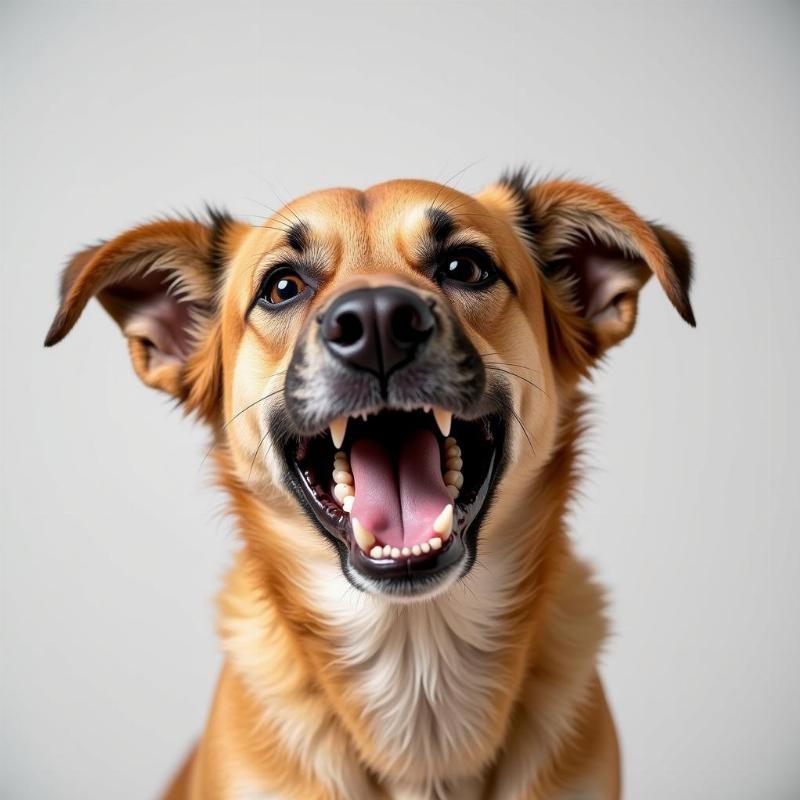A dog’s growl can be unsettling, especially if it sounds like a “mad dog.” But before you panic, it’s crucial to understand that growling isn’t always a sign of aggression. In fact, it’s a vital form of canine communication. This article will delve into the various reasons why dogs growl, how to differentiate between types of growls, and what steps you can take to address the underlying cause. This information will empower you to understand your furry friend better and ensure a harmonious relationship.
Decoding the “Mad Dog” Growl: What Does It Mean?
A low, guttural growl, often accompanied by bared teeth and a stiff posture, is typically what people associate with a “mad dog.” However, this image is often a misconception. While it can indicate aggression, a growl is primarily a warning signal. Your dog is communicating discomfort, fear, or possessiveness. It’s their way of saying, “Back off!” before resorting to more drastic measures like biting. Understanding the context of the growl is key to interpreting its meaning. Is your dog guarding a toy? Are they in pain? Are they feeling threatened by a stranger?
 Aggressive Dog Growling
Aggressive Dog Growling
Common Reasons Why Dogs Growl Like a Mad Dog
Several factors can trigger a growl. Identifying the root cause is essential for effective intervention. Some common reasons include:
- Possessiveness: This is often seen when a dog growls while eating, playing with a favorite toy, or even when someone approaches their bed. tug a rope for dogs
- Fear or Anxiety: A fearful dog may growl when faced with unfamiliar people, animals, or situations. They might also growl if they feel cornered or trapped. mad dog put in bay
- Pain or Discomfort: If your dog is injured or unwell, they might growl if touched in a sensitive area. A sudden onset of growling can be a sign of underlying medical issues.
- Territoriality: Some dogs growl to protect their home or yard from perceived intruders, be it other animals or people.
- Maternal Instincts: Mother dogs often growl protectively over their puppies.
Responding to a Growling Dog: Do’s and Don’ts
- Don’t punish the growl: Scolding or punishing a growling dog only suppresses the warning signal, making them more likely to bite without warning in the future. aggressive dog training austin tx
- Do identify the trigger: Observe your dog’s behavior carefully to determine what causes the growling. Once you know the trigger, you can start addressing the underlying issue.
- Do seek professional help: If the growling is persistent or escalating, consult with a certified professional dog trainer or a veterinary behaviorist. They can help develop a tailored behavior modification plan. i tamed my ex-husband's mad dog chapter 41
- Do create a safe space: If your dog is growling out of fear or anxiety, provide them with a safe, quiet retreat where they can feel secure.
- Do manage the environment: If your dog is possessive over food, feed them in a separate area. If they’re territorial, ensure they have a designated space away from high-traffic areas. do squeaky toys make dogs aggressive
Conclusion: Understanding the Nuances of a Growl
Understanding why your dog growls like a “mad dog” is crucial for both your safety and theirs. By recognizing the growl as a form of communication, identifying the underlying triggers, and seeking professional guidance when needed, you can build a stronger, more trusting relationship with your canine companion. Remember, addressing the cause of the growl, rather than suppressing the behavior itself, is the key to a harmonious coexistence.
FAQ
- Why is my dog suddenly growling at me? Sudden growling can indicate pain, illness, or a change in the dog’s environment.
- Is it normal for puppies to growl? Yes, puppies growl as part of their play and development. However, it’s important to teach them appropriate bite inhibition.
- Can growling be a sign of dominance? While the concept of dominance in dogs is complex, growling can sometimes be related to resource guarding.
- Should I be concerned if my dog growls at children? Yes, any growling directed towards children should be taken seriously. Consult with a professional trainer immediately.
- How can I stop my dog from growling at other dogs? Professional guidance is recommended for addressing inter-dog aggression. Avoid forcing interactions and focus on positive reinforcement training.
- What if my dog growls at the vet? Inform the vet beforehand so they can take appropriate precautions and make the experience less stressful for your dog.
- Can a growl always be a precursor to a bite? Not always. Growling is a warning signal. However, if the warning is ignored, a bite can occur.
Beautdogs.us is your premier destination for all things dog-related in the US. We offer expert advice on dog breeds, care, and products, catering to both novice and experienced dog owners. Our team of experts is dedicated to providing you with reliable information to help you navigate the joys and challenges of dog ownership. For inquiries, reach us at [email protected] or call us at +1 501-555-7529. Visit Beautdogs.us for more insightful articles and resources.